المساعدات النقدية والقسائم والمخاطر
ما سبب أهمية هذا الموضوع؟
أحد الأسباب الرئيسية التي تجعل الجهات الفاعلة الإنسانية لا تفكر بشكل روتيني في النقد (الهدف رقم 2 من الإطار العالمي للعمل) هو تصورات المخاطر. ويرتبط هذا القلق بالتركيز المتزايد من قبل الجهات المانحة على مكافحة الإرهاب وغسيل الأموال وتقليص الميزانيات المخصصة للمساعدة الإنسانية.
كانت هذه نتيجة رئيسية من تقرير حالة العالم النقدي لشبكة CALP، والذي أشار أيضًا إلى أن الجهات المانحة قد تتسامح مع تحويل مبلغ صغير من المساعدات العينية ولكن يمكن أن تكون أكثر حساسية تجاه تحويل الأموال النقدية. تم نقل هذه الحساسية من الجهات المانحة إلى الوكالات الإنسانية الأخرى. تعتبر هذه القضية حساسة بشكل خاص في بيئات النزاع، حيث تشكل الجماعات المسلحة تهديدًا ويصعب على الجهات الفاعلة الإنسانية الوصول إلى المجتمعات المتضررة والإشراف على الاستجابة.
ما هو شكل التقدم المحرز في هذا المجال؟
لكي يتم النظر في المساعدات النقدية والقسائم بشكل منتظم، فإن النجاح يعني ما يلي:
- ويتم الكشف عن الخرافات بشأن المساعدات النقدية والقسائم ويتغير خطاب ومواقف وسلوك الجهات الفاعلة في المجال الإنساني حول مخاطر التحايل
- يتم النظر في المساعدات النقدية والقسائم بشكل منهجي وعلى قدم المساواة، على أساس أدلة المخاطر الفعلية عبر الطرائق
- لا تمنع الحواجز التنظيمية، مثل أجندة الجهات المانحة لمكافحة الإرهاب والتخلص من المخاطر، النظر المنتظم في النقد.
- يتم التعامل مع المخاطر من خلال التعاون بين الجهات الفاعلة الإنسانية التشغيلية والحكومات والجهات المانحة والمؤسسات المالية.
يمتلك الموظفون التشغيليون القدرات والأدوات العملية لتحديد المخاطر والتخفيف من حدتها.
للعمل نحو هذه الأهداف يعني معالجة المخاطر على مدار دورة المشروع، بناءً على الأسئلة التالية:
- تحليل الموقف: كيف يتم إدراك المخاطر الخاصة بالمساعدات النقدية والقسائم؟
- تحليل الاستجابة: كيف تؤثر مخاطر محددة من المساعدات النقدية والقسائم على اتخاذ القرار؟
- تصميم البرنامج: ما هي تدابير التخفيف المطبقة بالفعل؟
- التنفيذ: كيف يمكن أن اعتماد البرامج وتدابير التخفيف بمرور الوقت؟
- الرصد والتقييم: ما مدى فعالية تدابير التخفيف وما هو تأثيرها؟
المبادرات والأخبار الجارية
على مدار الأشهر المقبلة، سنعقد مجموعة من الاجتماعات مع الجهات الفاعلة لمناقشة مواضيع مختلفة تتعلق بموضوع المخاطر، مع أهداف تعزيز النقاش وتوليفه، وتوفير منتدى للجهات الفاعلة لمشاركة أفضل الممارسات، وضمان تعزيز الخبرات على المستوى الميداني في العالم.
17 تشرين الأول: الندوة: مشاركة البيانات الخاصة بالمساعدات النقدية والقسائم: الأخلاق والملكية والخصوصية
29 تشرين الأول: المساعدات النقية والقسائم والمخاطر المتعلقة بالاحتيال وحماية المستفيدين، دوالا، الكاميرون
31 أ تشرين الأول – 1 تشرين الأول: المساعدات النقدية والقسائم في سوريا، غازي عنتاب، تركيا (حدث خاص)
21 تشرين الثاني: الندوة: الجاهزية التنظيمي لإدارة البيانات.
26 تشرين الثاني: التركيز على حماية بيانات المستفيدين في العمل، داكار، السنغال.
4 كانون الاول: فعالية أسبوع النقد: مكافحة تمويل الإرهاب وتدابير مكافحة غسل الأموال في المساعدات النقدية والقسائم، ومسؤولية البيانات وحمايتها في المساعدات النقدية والقصائم في المجال الإنساني، لندن، المملكة المتحدة. تعرف على المزيد هنا.
تعمل مجموعة متنوعة من المنظمات حاليًا على المساعدات النقدية والقسائم والمخاطر. تعمل شبكة CALP على تحديد أوجه التآزر بين الجهات الفاعلة، وتجنب الازدواجية، وتحديد الأولويات المشتركة التي يمكن معالجتها بشكل جماعي بشكل أفضل. بالاشتراك مع برنامج الأغذية العالمي، تشارك شبكة CALP في تحديد أولوية المخاطر ضمن مسار عمل الصفقة الكبرى بشأن النقد.
دراسة حالة عن المخاطر في مالي باللغتين الإنجليزية والفرنسية.
دراسة حالة عن المساعدات النقدية والقسائم والمخاطر في اليمن، تقرير كامل.
يمكن مشاهدة ندوة الويب الخاصة بنا حول مشاركة البيانات في المساعدات النقدية والقسائم: الأخلاق والملكية والخصوصية
يمكن مشاهدة ندوة الويب الخاصة بنا التي تعرض رؤى من مؤلفي دراسات الحالة الخاصة بنا في اليمن وشمال مالي.
لمزيد من المعلومات، يرجى الاتصال بآنا كونداخشيان.
Latest

اجتماع أعضاء شبكة CALP في منطقة الشرق الأوسط وشمال إفريقيا
حدث
اجتماع عبر الإنترنت- 6 أذار 2024، 11:00-13:30 بتوقيت عمّان
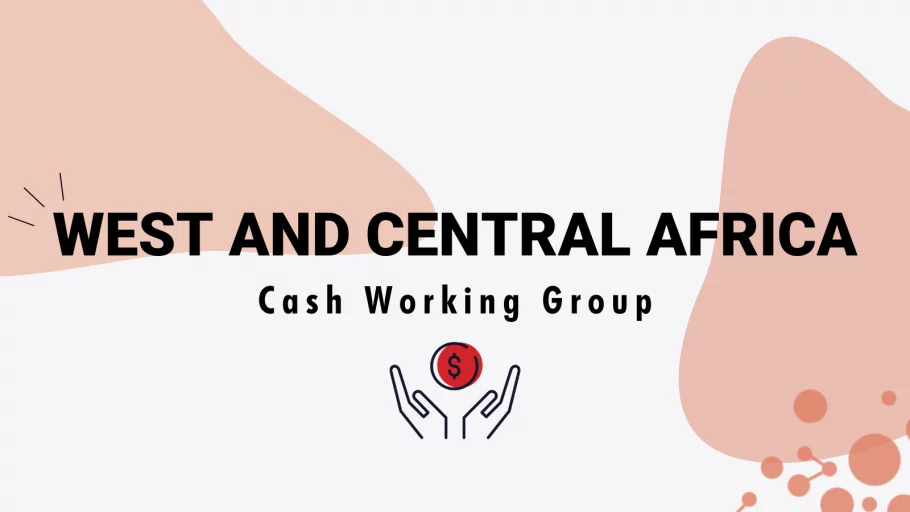
Regional Cash Working Group – WCAF
Event
This is a Save the Date for the next Regional Cash Working Group meeting that will take place on Wednesday March 06TH, 2024 from 9am to 11am (GMT) face to face and on line The meeting will have simultaneous interpretation in English and French. The agenda for this meeting will be: National CWGs round...

Minutes and presentations from the WCAF regional CWG
Meeting minutes
Minutes and presentations from the WCAF regional CWG – 6 March 2024 Watch the recording here or on YouTube:

مؤشرات للتخفيف من مخاطر العنف القائم على النوع الاجتماعي لدى تقديم المساعدات النقدية
إرشادات وأدوات
يقدّم هذا الدليل مؤشرات بديلة لتقييم مخاطر العنف القائم على النوع الاجتماعي على النساء في تدخلات النقد. يمكن أن تعمد الجهات الفاعلة في مجال المساعدة النقدية إلى تكييف...
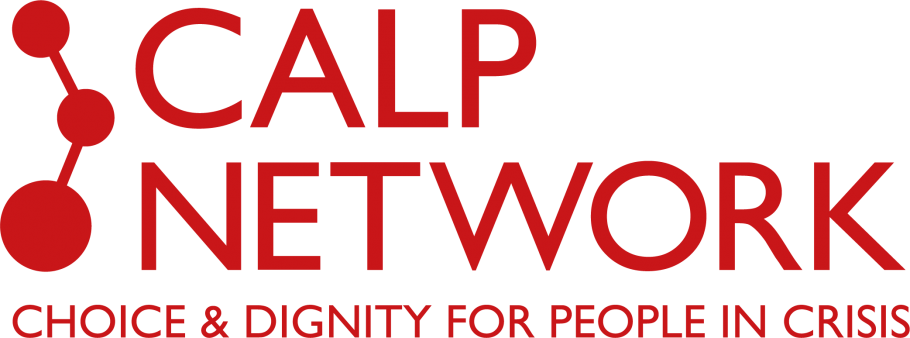
CALP Board Meeting
Members event
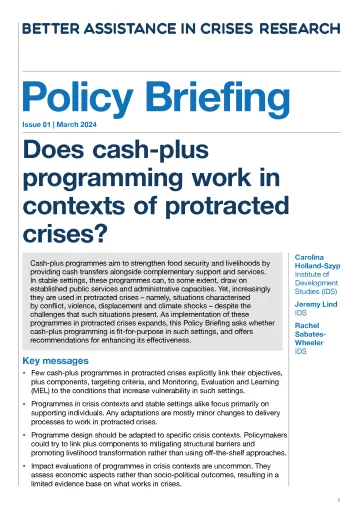
Does Cash-Plus Programming Work in Contexts of Protracted Crises?
Policy paper
Cash-plus programmes aim to strengthen food security and livelihoods by providing cash transfers alongside complementary support and services. In stable settings, these programmes can, to some extent, draw on established public services and administrative capacities. Yet, increasingly they are used in...

NGO Policy Dialogue Roundtable
Members event
ICVA and CALP would like to invite NGOs to a one-hour roundtable discussion for NGOs on 29th February at 9am UTC as part of a BHA and CALP convened CVA Policy Dialogue process. Please register here.
As part of the process, constituency roundtables have been organized e.g., among local organizations,...

South Sudan Joint Markets Monitoring Initiative (JMMI) Workshop
Members event
South Sudan Cash Working Group in collaboration with REACH and the CALP Network East and Southern Africa Regional Office wishes to extend an invitation to all CWG Members collecting JMMI data for the JMMI Workshop on Enhancing Market Monitoring in South Sudan. The virtual workshop is scheduled for...

Exploring linkages between Cash and Voucher Assistance and Social Protection in West and Central Africa
Webinar recording
This is the first in a series of webinars that aims to explore the connections between humanitarian CVA and social protection in West and Central Africa region. The webinar sought to frame the discussion with opening remarks from Dr. Sintike Tarfa Ugbe, Director of Humanitarian & Social Affairs of the...
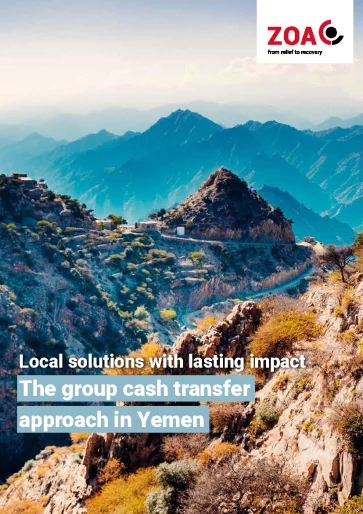
The Group Cash Transfer Approach in Yemen
Case Study
The GCT approach was contextualized and piloted successfully in both North and South Yemen by ZOA Yemen and its local partner SDF in 2022 and 2023. More than 100 community groups submitted their plans and received cash transfers to implement their proposed activities. Cash transfers ranged from 2,000 USD...

Linking Social Protection and Humanitarian CVA
Training
Please note that this is a 2-day face-to-face training, which will be delivered on 26th to 27th February 2024 in Dushanbe, Tajikistan. This event will be delivered in English with translation to Russian.

Locally Led Anticipatory Action Guide and Toolkit
Guidelines and Tools
How civil society organisations can engage with communities, and collaborate with mandated, technical and donor agencies to localise and scale up early warning and early action
The purpose of the guide is to support civil society organisations to engage with communities and other actors and structures...
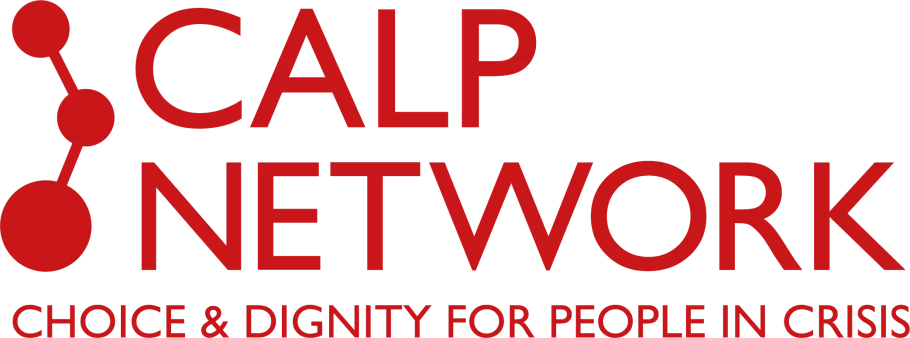
Data Responsibility Working Group (DRWG) Task Team on Cash
Members event
Promotes and tracks implementation of the IASC's Data Responsibility Guidance

CALP TAG (Technical Advisory Group) Meeting
Members event
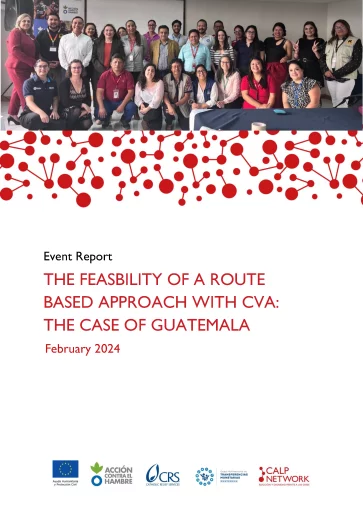
Event Report: The feasibility of a route-based approach with CVA: The case of Guatemala
Meeting minutes
In 2022, CALP recognized the importance of human mobility and CVA and invited its network to contribute to the evidence and debate. CALP conducted the study People are on the move: Can the world of CVA keep up? Analysis of the use of CVA in the context of human mobility in the Americas examined the use of...
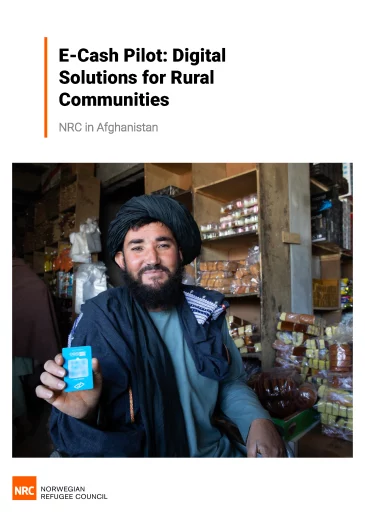
E-Cash Pilot: Digital Solutions for Rural Communities
Report
An innovative digital cash project piloted by the Norwegian Refugee Council (NRC) in the Maiwand district of Kandahar province has successfully demonstrated a new and more secure way of providing humanitarian assistance while significantly enhancing the inclusion and resilience of rural...

Pathways Toward a Green Humanitarian Response
Report
The humanitarian sector is grappling with the task of reducing its negative impacts upon the climate and environment. Despite growing awareness of the need to shift towards greener action, tangible change and outcomes have remained frustratingly limited, while the impacts of climate and environmental...
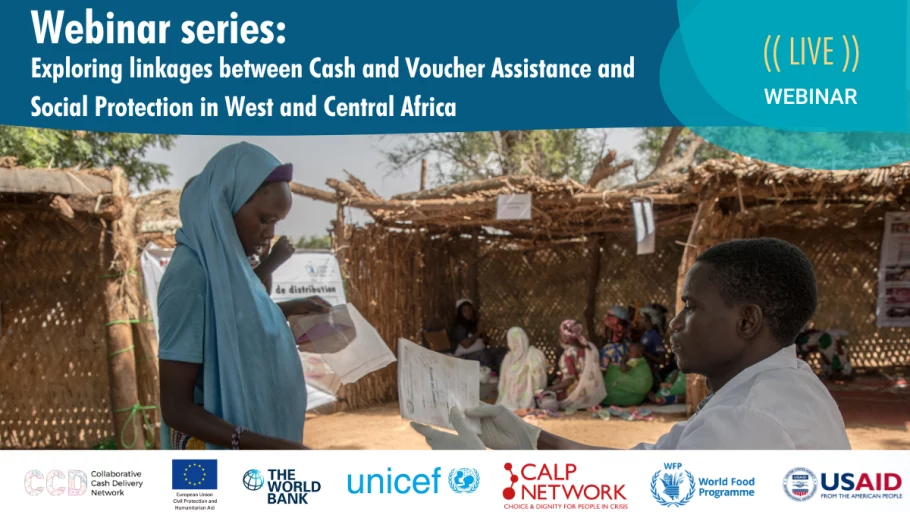
Webinar series: Exploring linkages between Cash and Voucher Assistance and Social Protection in West and Central Africa
Webinar
There was a lot of buzz on the need to link humanitarian assistance to social protection (SP) systems, especially during the COVID pandemic. The linkage should encompass various contexts from stable well-organised states, preferred context by development and social protection stakeholders, to conflict...

Addressing Negative Socioeconomic Impacts of the COVID-19 Pandemic through Social Protection in Viet Nam – Supporting incomes and livelihoods with cash assistance in Dong Nai province
Case Study
In late April 2021, Viet Nam faced its fourth wave of COVID-19, with over 895 000 new cases reported. COVID-19 and related restrictions hindered livelihood options and vulnerable households faced financial stress to cover basic needs. Some of them lost their income and were unable to return to home...

Special session: Payments group, RedRose
Members event
This special session of the Payment Solution Seekers roundtable group is part of a series of events that seeks to increase the surface area between private sector payment companies and Cash and Voucher Assistance (CVA) implementing organisations.
This event gives implementing organisations a chance to...


